OUR STORY/YOUR STORY
I don’t want to brag, I really don’t, but you are friends. I suspect you read BookNotes and support Hearts & Minds – keep those orders coming! – because there is something just a little unusual about our mix of titles, our personal connection when you order, and our efforts to maintain historic Christian orthodoxy while encouraging a wide and diverse reading regimen. I think you hang in there with us because you value this approach.
You know that the latest marketing guys all say that businesses should “tell their story” — that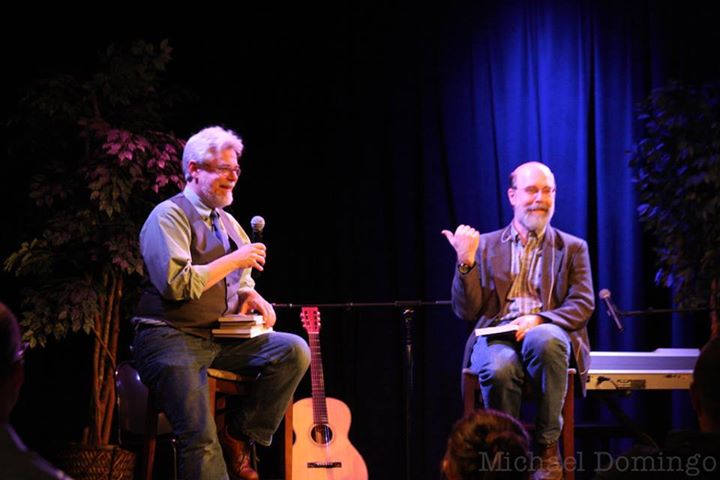 customers want to understand what we do and why we do it. That’s nothing new to me: I’ve always been an evangelist for our work, because I really believe in the role of reading and the power of books. We foul up enough that I know well to be humble, but I’m happy to emote about our work, our staff, our services, our customers who care. When I was only half-jokingly over-doing a sales pitch during the Michael Card event the other night, he asked the crowd “Is he always like this?”
customers want to understand what we do and why we do it. That’s nothing new to me: I’ve always been an evangelist for our work, because I really believe in the role of reading and the power of books. We foul up enough that I know well to be humble, but I’m happy to emote about our work, our staff, our services, our customers who care. When I was only half-jokingly over-doing a sales pitch during the Michael Card event the other night, he asked the crowd “Is he always like this?”
Yep, pretty much.
So, welcome, once again, to our story. To your story, too.
Just in this last week we have again been complimented in ways that are deeply encouraging and, frankly, still sometimes leave us surprised. Customers take note that we have books on the arts. Somebody is surprised that we carry a range of opinion on matters of faith, science, and the debates about origins. One person was flummoxed that we carry more than religious novels, even literary fiction, some R-rated. A person was helped by a thoughtful list of books about grief, titles that were not clichéd or simplistic. At a good conference a few weeks ago on faith and the work-world at a hip mega-church more than one person looking at our display said they never saw books like this before. Faith-based books on teaching, technology, business, sports, or media are hard to find, apparently.
Again and again, we hear that readers are eager to support booksellers that are independent in spirit (and in fact; it is hard to be down-home when one is owned by a faceless corporation from who knows where.)
And we hear that folks are glad that we carry books across the whole spectrum of life, showcasing that body of literature that integrates a faithful Christian perspective with this field, that career, this academic discipline or that vocational arena. As Francis Schaeffer used to say, true spirituality shows forth the “Lordship of Christ across the whole of culture.” We are “evangelicals for social action” and committed to “marketplace ministry” and want to help equip “culture makers.” We may hope for more, but certainly not less than Hunter’s “faithful presence.” We are proud that we were recently quoted in Greg Jao’s little book Your Mind’s Mission (IVP), which reminds us that it is in service to the world that we must read, study, and think through “a transforming vision.” We are, as Niebuhr put it, firmly in the “Christ transforming culture” camp.
Niebuhr’s categories notwithstanding, one needn’t be Reformed to desire to see the world changed by honoring Biblical principles in every zone of society. Catholics and Anabaptists, Congregationalists and Pentecostals, each in their own ways, have highlighted the call to fidelity “in the world but not of it.” Just read Aquinas or the Book of Common Prayer or Paul Alexander’s two illuminating studies showing that early 20th Pentecostals were pacifists who resisted war as worldly unholiness! Consider the thoughtful scholarship behind the speeches of Martin Luther King, Jr. Or the recent spate of books on Christian higher education coming from publishers like Abilene Christian University Press. Those that know us know that we have more than a superficial indebtedness to many streams within the broad flow of Christian history and tradition! It is no accident that we so appreciate Richard Foster’s Streams of Living Water: Celebrating the Great Traditions of Christian Faith (HarperOne) and the fun and maybe not-so-tongue-in-cheek mile-long subtitle of Brian McLaren’s all embracing Generous Orthodoxy (Zondervan) where he somewhat affirms nearly every doctrinal view under the sun.
AND I’M NOT EVEN DUTCH
Still, for us, we’ve learned about the importance of Christian books that offer Christian thinking
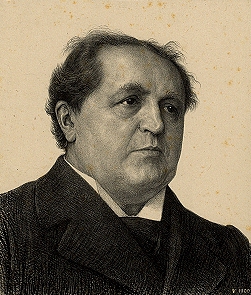
Portrait of Abraham Kuyper by Jan Veth (1900). (Photo credit: Wikipedia)
for an inner reformation of each sphere of life from the Dutch neo-Calvinists who stand in the line of Abraham Kuyper. Phrases like “uniquely Christian perspectives” or “distinctively Biblical thinking” or The Outrageous Idea of Academic Faithfulness — a great book title by friends Don Optiz and Derek Melleby which informs some of our beloved Jubilee conference in Pittsburgh each year — come to us, mostly, from the culturally-engaged, radically Christian reformational movement from early 20th century Holland. I wish I had a shirt that said Kuyper is my home-boy.
Even mainstream, socially conscious evangelicals — think Carl Henry,
Francis and Edith Schaeffer or Charles Colson — who in the middle to late 20th century pulled that tradition away from Bible thumpin’ fundamentalism, have been influenced by Kuyper.
WHERE DO YOU GUYS COME UP WITH THIS STUFF?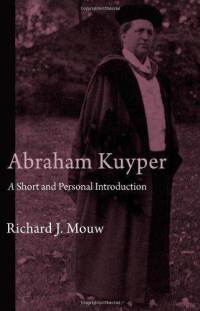 I have written about the Rev. Dr. College President and Prime Minister Kuyper from time to time (and have cited his call to press Christ’s gracious Kingship in “every square inch” of creation maybe too often.) Richard Mouw’s short and accessible book, Abraham Kuyper: A Short and Personal Introduction (Eerdmans; $16.00) explaining why and how discovering Kuyper helped him is one of my favorite books to suggest when somebody asks “where did you guys come up with this stuff?” (You can read my review here.)
I have written about the Rev. Dr. College President and Prime Minister Kuyper from time to time (and have cited his call to press Christ’s gracious Kingship in “every square inch” of creation maybe too often.) Richard Mouw’s short and accessible book, Abraham Kuyper: A Short and Personal Introduction (Eerdmans; $16.00) explaining why and how discovering Kuyper helped him is one of my favorite books to suggest when somebody asks “where did you guys come up with this stuff?” (You can read my review here.)
Yes, the Kuyperian worldview, embodied by what is sometimes called the “reformational movement” of Christian scholarship, provided one of the chief impetuses for starting Hearts & Minds 30 years ago.
It is awkward to say it so bluntly, but we have learned that it is novel for a Christian bookstore – I heard it again just today from a traveling sales rep from out of state! – to carry such a wide array of titles in such a wide array of categories, from environmental studies to film studies, from gender justice to racial justice, from science to sociology to philosophy, right next to Biblical studies and theology and global missions. With all the “focus on the family” emphasis in many Christian bookstores, I don’t know if they have much on, say, breast feeding or home births, but we’ve got that, too. In an embarrassingly positive story recently in an industry trade journal, Beth and I were called “paradigm shifters” for our approach to Christian bookselling. Whew.
Anyway, part of our story is that we got this vision from people who were, mostly, in one way or another, influenced by Abraham Kuyper.
FOUR NEW BOOKS
And so, we are very glad that there are four new books on Kuyper. If you are attracted to our mission, you might be too.
First I’ll tell you about a new little booklet which reproduces a famous sermon expressing Kuyper’s view of the nature of the church. Then there is the third in a series produced by the Kuyper Center at Princeton Seminary (this one on creativity and the arts.) Thirdly, I’ll highlight a magisterial new biography by James Bratt, a telling of the story for which we have been waiting for years — this is now surely the definitive bio of Father Abraham! Lastly, there is a stunningly serious collection of essays and excerpts co-edited by uber-Kuyper geek Steven Bishop from England and Dordt College Press publishing guru, John Kok.
My remarks about these last two were previously published in a slightly shortened version in my monthly “Politics and Prose” column in the neo-Calvinist political newsletter, Capital Commentary published by the Center for Public Justice. Their work for a non-partisan Christian political option has connections, in spirit at least, to the Dutch political party started by Kuyper in the early 1900s, reformed in 1977 as the Christian Democratic Appeal. It seemed proper to announce the publication of those two big Kuyper volumes there, but I’ve been itching to share them with our wider audience here at BookNotes. I do hope you read my comments about them, and that they inspire you to learn more about this towering figure of public theology.
A FREE BOOK
To show an example of how Kuyperian thought shaped a major study of society applied to a proposal for a just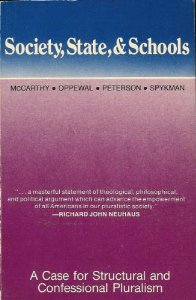 education policy, we are offering a FREE copy of an old Eerdmans book co-published by the Center for Public Justice entitled Society State and Schools: A Case for Structural and Confessional Pluralism (edited by Gordon Spykman et al.) With any order of any of these Kuyper books you can have this thoughtful classic for free. We have the four Kuyper books at our BookNotes special discount (20% off) and will send this free book along as long as supplies last. It is a dazzling example of a careful study of society and, to be honest, has not been bettered in the decades since its initial publication. Anyway, it’s a good deal, and we’re happy to share it, if you buy any Kuyper book from this little list.
education policy, we are offering a FREE copy of an old Eerdmans book co-published by the Center for Public Justice entitled Society State and Schools: A Case for Structural and Confessional Pluralism (edited by Gordon Spykman et al.) With any order of any of these Kuyper books you can have this thoughtful classic for free. We have the four Kuyper books at our BookNotes special discount (20% off) and will send this free book along as long as supplies last. It is a dazzling example of a careful study of society and, to be honest, has not been bettered in the decades since its initial publication. Anyway, it’s a good deal, and we’re happy to share it, if you buy any Kuyper book from this little list.
KUYPER ON THE CHURCH
R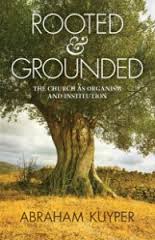 ooted & Grounded: The Church as Organism and Institution Abraham Kuyper (Christian’s Library Press) $4.95 This inexpensive 45-page booklet is translated from the Dutch by Nelson D. Kloosterman and is co-published by the Acton Institute and Kuyper College in Grand Rapids. It was an inaugural sermon by Kuyper for a new denomination, so is, frankly, exceptionally timely today. In it, he explains the important distinction between being first rooted, then grounded, in the gospel, which is a way to help explain the broad vision of the church as God’s people in the world, and the more formal manifestation known as the institutional church. It was tricky to translate, we are told, because of the passion and eloquence with which it was written and delivered. This small book anticipates a large, multi-volume set that will someday appear offering other writings on the church by the prolific thinker and church leader.
ooted & Grounded: The Church as Organism and Institution Abraham Kuyper (Christian’s Library Press) $4.95 This inexpensive 45-page booklet is translated from the Dutch by Nelson D. Kloosterman and is co-published by the Acton Institute and Kuyper College in Grand Rapids. It was an inaugural sermon by Kuyper for a new denomination, so is, frankly, exceptionally timely today. In it, he explains the important distinction between being first rooted, then grounded, in the gospel, which is a way to help explain the broad vision of the church as God’s people in the world, and the more formal manifestation known as the institutional church. It was tricky to translate, we are told, because of the passion and eloquence with which it was written and delivered. This small book anticipates a large, multi-volume set that will someday appear offering other writings on the church by the prolific thinker and church leader.
In an illuminating introduction, Kuyper scholar John Halsey Wood tells us that even as the ground shifted underneath the feet of those in Europe in those extraordinary times, Kuyper repeatedly examined the task and measured the fidelity of the church. “It should not surprise us, then,” Wood writes, ” to find that Kuyper often thought in terms similar to Max Weber’s and Ernst Troeltsch…” From a different perspective, perhaps, it might bring to mind the
important work of Free Methodist Howard Snyder, who talks about the
church gathered as community and sent into society to point to the
Kingdom, thereby being “a community of the King.”
Of course God’s people are scattered throughout society, and — the back cover literally quotes Steve Garber’s phrase “vocation is intregal, not incidental to the missio dei” — Kuyper helps us all get that organic sense of God’s transforming movement creeping like leaven throughout society. But he also attends seriously to the institutional church and her struggles and the principles which guide her development.
This is therefore an important and vital little book, not only as a historical documentation. Church leaders in our day are very aware of the “spiritual but not religious” ethos and the popping up of missional faith communities that sometimes define themselves boldly as unaffiliated with the broader church (let alone denominations or clear theological traditions.) Could this old sermon by this old Dutchman shed light on the up-to-the-minutes debates about the postmodern emergents and what some are calling the hyphenateds? Can this study of the church help the “faith at work” movement or the social justice efforts of activist disciples of Jesus? Can fresh expressions of faith outside the walls of typical churches bear lasting Kingdom fruit? I think this message and the many footnotes and editorial additions added can provide much insight into Kuyper’s views and will be good fodder for important conversation, including for those breaking off of historic denominations, forming new networks and models of affiliation. Whether you tend towards the organic or institutional, edgy new missional ministries or historic and ordinary congregations, this “both/and” message will keep you rooted and grounded.
T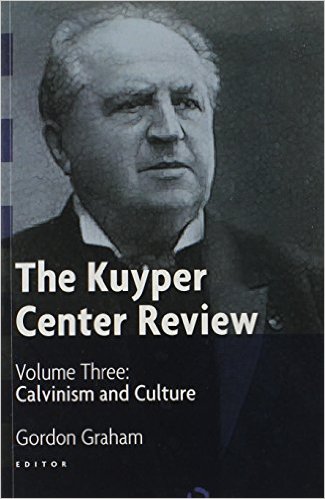 he Kuyper Center Review Volume Three: Calvinism and Culture edited by Gordon Graham (Eerdmans) $26.00 Graham is the Henry Luce Professor of Philosophy and the Arts at Princeton and was the editor of the first in these dense, serious compilations of serious Kuyper-related scholarship –Volume One was on politics and sphere sovereignty, very important for understanding Kuyper’s social philosophy and his call to reform the very architecture of society.) Volume Two, by the way, was edited by John Bowlin and was on Kuyper’s view of Revelation and Common Grace.
he Kuyper Center Review Volume Three: Calvinism and Culture edited by Gordon Graham (Eerdmans) $26.00 Graham is the Henry Luce Professor of Philosophy and the Arts at Princeton and was the editor of the first in these dense, serious compilations of serious Kuyper-related scholarship –Volume One was on politics and sphere sovereignty, very important for understanding Kuyper’s social philosophy and his call to reform the very architecture of society.) Volume Two, by the way, was edited by John Bowlin and was on Kuyper’s view of Revelation and Common Grace.
These new essays in Volume Three: Calvinism and Culture are remarkable, scholarly, fascinating, a delight to read for those who love learning and considering new ideas. There are a few general chapters here which examine Kuyperian and neo-Calvinist takes on culture (which will be surprising to some) and I highly recommend this volume for them.
After a fantastic and inspiring opening essay, however, comes one that is spectacularly interesting and even controversial – Neal DeRoo does a close (although, as it ends up, perhaps not close enough) reading of Al Wolters’ significant overview of a reformational worldview (the popular and enduring Creation Regained) suggesting that Wolters’ view of culture (and his account of the nature of the spheres of culture, whose structures are said to be part of creation and whose ordering laws call forth certain responses) is not sustainable, or even meaningful, laden with inherent problems. Indeed, the chapter is entitled “Creation Regained? On the Impossibility and Meaninglessness of Culture in (Some) Calvinist Thought.” Ouch! This detailed, well-footnoted, critical essay moves deftly around th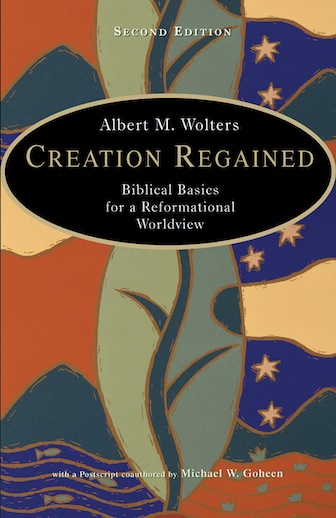 e Kuyperian philosophers Dooyeweerd and Vollenhoven (whose presence looms large behind the scenes in Creation Regained), bringing immense philosophical learning to bear as he uses their insights to critique Dr. Wolters and his essential text. Wolters was one of the founders of the Institute for Christian Studies (where DeRoo studied) so there is an admittedly in-house quarrel going on here. Editor Graham was wise in allowing professor Wolters to respond to DeRoo’s critique and his reply is typically gracious and, I think, mostly compelling. He makes the case that DeRoo misreads him and suffers not only from a misunderstanding of Dooyeweerdian philosophy but from a deficiency in writing clearly, at least in parts of his chapter. (I thought it was just me and my own lack of familiarity with the philosophical lingo and details, even as I studied each paragraph and footnote with eagerness. Does this somehow relate to the nuanced debate between brother-in-laws Dooyeweerd and Vollenhoven? Or a generational difference between older-school Wolters and postmodern DeRoos? Eccelsia semper reformanda est?)
e Kuyperian philosophers Dooyeweerd and Vollenhoven (whose presence looms large behind the scenes in Creation Regained), bringing immense philosophical learning to bear as he uses their insights to critique Dr. Wolters and his essential text. Wolters was one of the founders of the Institute for Christian Studies (where DeRoo studied) so there is an admittedly in-house quarrel going on here. Editor Graham was wise in allowing professor Wolters to respond to DeRoo’s critique and his reply is typically gracious and, I think, mostly compelling. He makes the case that DeRoo misreads him and suffers not only from a misunderstanding of Dooyeweerdian philosophy but from a deficiency in writing clearly, at least in parts of his chapter. (I thought it was just me and my own lack of familiarity with the philosophical lingo and details, even as I studied each paragraph and footnote with eagerness. Does this somehow relate to the nuanced debate between brother-in-laws Dooyeweerd and Vollenhoven? Or a generational difference between older-school Wolters and postmodern DeRoos? Eccelsia semper reformanda est?)
I believe that for many, this pair of essays will be worth the price of the book and may illustrates an internal struggle within this school of thought, and the institutions (such as ICS) that stand in their line. If you are even vaguely interested in this movement – from the old Vanguard magazine of the 70s to Comment published nowadays by Kuyperian think-tank Cardus under the helm of James K.A. Smith – I think this discussion is very, very important. But it is just the beginning of this fascinating crash course on Calvinian views of the arts and culture.
The other chapters that make up the bulk of The Kuyper Center Review Volume Three are diverse and quite interesting. There is a chapter on Calvinism, architecture and urban space. There is a piece on music (relating Dooyeweerdian teaching and the musical avant garde) that is stunning. There is a excellent piece about tragedy in literature. One fine (if demanding) essay compares Kuyper and Colin Gunton; another compares Kuyper and the influential Swiss teacher of the likes of Bonhoeffer, Barth, Bultmann, Tillich, namely, Adolf Schlatter.
There is a great chapter on Kuyper on public entertainment, another on a neo-Calvinist view of “the Eucharistic poetics of Emily Dickinson” and one by John Barber on Calvin’s views of music. I was amazed by a brilliant piece by James Bratt on Kuyper as “the jilted Stepfather of Piet Mondrian” that anybody who cares about Reformed theology and modern art should read. Wow — who knew of this famous modern artists relationship to the Kuyperian revival?
Reading anthologies like this in the 70s is what first alerted me to the robust tradition of evangelical and Reformed scholarship, learning that there was this movement of thinkers who did overtly Christian scholarship that related faith and their particular field. Again, many non-Calvinists do this quite well. There is little doubt, though, that the Reformed tradition, drawing on Kuyper’s broad view of creation, common grace, and the Biblical mandate for the reformation of thought, has paved a way for the renewal of evangelical cultural consideration in our lifetime. (Mark Noll’s essential The Scandal of the Evangelical Mind (Eerdmans) documents this, as does George Marsden’s little Oxford University Press book The Outrageous Idea of Christian Scholarship.) This new book is a great example of the fruitfulness of this particular tradition and reminds us how much there is to learn, and how theology can inform so much more than church squabbles and doctrinal debates per se. Drawing on the stalwarts of this tradition – Bavink, Ridderbos, Schilder, Runner, show up in footnotes — this is an example of theology for life, intellectual faithfulness for public service! Kudos to Princeton for hosting the conferences from which this book emerg
ed. And Kudos to Eerdmans for making them widely available. I hope you don’t think it too arcane or odd. I am confident it will inspire many to do greater works, works of cultural renewal and artistic hope for the common good. May this aspect, at least, of the spirit of Kuyper, inspire an ongoing conversation on the nature of cultural renewal in our time.
A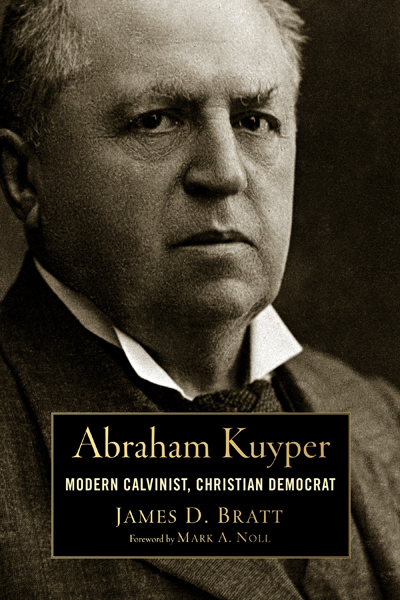 braham Kuyper: Modern Calvinist, Christian Democrat James Bratt (Eerdmans) $30.00 This hefty biography is nothing short of magisterial. There have been other biographies of Kuyper but none have approached the comprehensive, thorough scope of this extraordinary work. Bratt is a renowned historian (who teaches at Calvin College) and, as the forward by eminent evangelical scholar Mark Noll puts it, has given us a landmark book which answers the question “who was Abraham Kuyper and why should we care.” You needn’t take my word that Abraham Kuyper: MCCD accomplishes this marvelously; some of the most renowned writers within this tradition (Mouw, Wolterstorf, Marsden) insist it is “indispensable,” “marvelous,” “a page-turner,” which “many of us have been waiting for,” and which will “serve English speakers for years to come.” Anthony Bradley is surely correct when he says it will “undoubtedly become a classic.” And he is right that it is “indispensable reading for anyone interested in postindustrial Christian social thought.”
braham Kuyper: Modern Calvinist, Christian Democrat James Bratt (Eerdmans) $30.00 This hefty biography is nothing short of magisterial. There have been other biographies of Kuyper but none have approached the comprehensive, thorough scope of this extraordinary work. Bratt is a renowned historian (who teaches at Calvin College) and, as the forward by eminent evangelical scholar Mark Noll puts it, has given us a landmark book which answers the question “who was Abraham Kuyper and why should we care.” You needn’t take my word that Abraham Kuyper: MCCD accomplishes this marvelously; some of the most renowned writers within this tradition (Mouw, Wolterstorf, Marsden) insist it is “indispensable,” “marvelous,” “a page-turner,” which “many of us have been waiting for,” and which will “serve English speakers for years to come.” Anthony Bradley is surely correct when he says it will “undoubtedly become a classic.” And he is right that it is “indispensable reading for anyone interested in postindustrial Christian social thought.”
Kuyper was a fascinating, tireless, preacher, writer, organizer — a “volcanic” force which started a newspaper, a university, a labor union, a political party, and more. His insistence on alternative political organizations within a robust societal pluralism and his insightful balance of seeing what is often called “common grace” and “the antithesis” remains very fruitful for our own time. The genesis and development of his many ideas and efforts (some drawn from his political associate, Groen van Prinsterer) are chronicled here, making this not only a superb exploration of his unique reformational worldview and its implications for politics, but it is, recall, a biography. This is a thrilling life story, set in the context of a swirling, changing era, of a complex, controversial, colorful character. It is, as Bratt says in his brilliant introduction, “warts and all.” Those of us who are seriously committed to working out some of the implications of his genius in our own day should know “Father Abraham” and his warts and blemishes and sins — and they were many! But, also, his fascinating, generative ideas and the strategies he used to see some of them come to fruition. Abraham Kuyper: Modern Calvinist, Christian Democrat is simply, a must-read, a tremendously researched historical biography of a towering figure. As I have said, Kuyper was influential in Holland, helped shape seminal figures like Francis Schaeffer, and left a mark on US evangelicalism that ripples out (even here in Dallastown) to this day. This is the book we’ve been waiting for!
O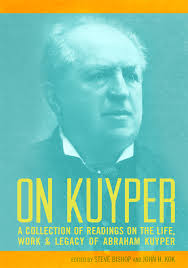 n Kuyper: A Collection of Readings on the Life, Work & Legacy of Abraham edited by Steve Bishop & John Kok (Dordt Press) $36.00 On Kuyper will most likely not sell as well as the epic new biography by Bratt, but for serious followers of the worldivewish tradition Cal Seerveld once called not merely Reformed but “reformational” and those seriously hoping to discern the implications of Kuyperianism for contemporary thought and social action, this collection is, again, indispensable, extraordinary, and within our circles, destined to become a classic. It may not be a page turner, but it is is, in some ways, perhaps more important than the biography. This is, without a doubt, the best anthology of essays about Kuyper yet done. It is compiled by gentlemen who are deeply rooted in the neo-Kuyperian movement made famous by Dooyeweerd, Vollenholven,and a generation of scholars at Toronto’s ICS. Here, we have some of the most astute Christian intellectuals of the last half a century ruminating on, and in some cases incisively dissecting, important details of Kuyper’s perspective and programs.
n Kuyper: A Collection of Readings on the Life, Work & Legacy of Abraham edited by Steve Bishop & John Kok (Dordt Press) $36.00 On Kuyper will most likely not sell as well as the epic new biography by Bratt, but for serious followers of the worldivewish tradition Cal Seerveld once called not merely Reformed but “reformational” and those seriously hoping to discern the implications of Kuyperianism for contemporary thought and social action, this collection is, again, indispensable, extraordinary, and within our circles, destined to become a classic. It may not be a page turner, but it is is, in some ways, perhaps more important than the biography. This is, without a doubt, the best anthology of essays about Kuyper yet done. It is compiled by gentlemen who are deeply rooted in the neo-Kuyperian movement made famous by Dooyeweerd, Vollenholven,and a generation of scholars at Toronto’s ICS. Here, we have some of the most astute Christian intellectuals of the last half a century ruminating on, and in some cases incisively dissecting, important details of Kuyper’s perspective and programs.
John Kok is an esteemed Dutch philosopher and President of Dordt Press. Steve Bishop is a feisty cultural critic and teacher (and the zealous internet guru who maintains the neo-Calvinist website allofliferedeemed.co.uk. Together they have brought together in one major volume (nearly 500 pages) authors who are, arguably, the world’s finest Kuyperian scholars – from philosophers like Vollenhoven, Zuidema, Klapwijk and Daniel Strauss, to theologians, churchman, political theorists and historians. There are excerpts here from popular biographies and there are previously-published scholarly articles and popular speeches. (And, very importantly, there are several pieces never published in English before!)
There are a few nice introductory essays about Kuyper’s life, including one by Catherine Kuyper, his daughter.
Many of the pieces explore certain aspects of the Kuyper project such as Mary Stewart Van Leeuwen’s detailed study of Kuyper’s writings on the role of women or Del Ratzch’s study of Kuyper’s view of evolution or Peter Heslam’s chapter on Kuyper’s view of the arts or George Harinck on the legacy of Kuyper in South Africa. Of course there are several exploring the unique notion of sphere sovereignty. Naturally, there are numerous pieces on the tradition of Christian Democracy, on Kuyper’s anti-revolutionary politics and Christian approaches to wise statecraft. Jim Skillen has an important contribution on how Kuyper’s views could shape a faith-based understanding of welfare reform, absolutely as relevant now as it was when published a decade ago!
There are more than 30 chapters, some truly lovely, others dense and scholarly. There is an excellent and useful introduction to Kuyper written by Bishop that is really helpful. The editors have given us an immense gift in finding, compiling and sharing these remarkable writings and we trust it becomes a staple in reformational studies for years to come.
This is a book we are honored to carry, glad to promote, and, arcane and clunky as it may sound, is a good example of the sorts of stuff that shapes who we are, has influenced us in the past, and is part of our story, the story of why we do what we do here at 234 East Main Street, Dallastown, PA. Thanks for caring enough to read these reviews and take up in your own way, Kuyper’s call to think hard and live joyfully, in but not of, the good but fallen culture which is so loved by our gracious King.
DISCOUNT
ANY ITEM MENTIONED
20% off
order here
takes you to the secure Hearts & Minds order form page
just tell us what you want
inquire here
if you have questions or need more information
just ask us what you want to know
Hearts & Minds 234 East Main Street Dallastown, PA 17313 717-246-3333
read@heartsandmindsbooks.com
